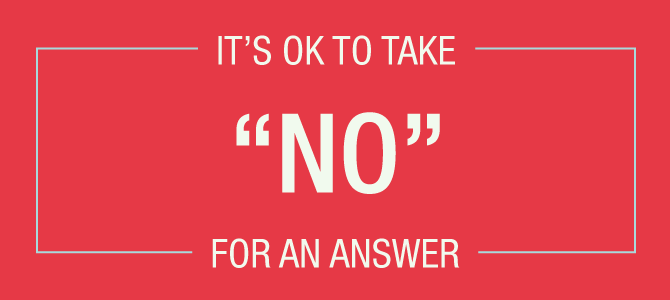It's OK to Take "No" For An Answer
Every time a salesperson contacts a potential lead, they’re already starting out with a disadvantage. It’s not their fault, but it’s the reality due to people’s previous experiences with salespeople. Their prospect will answer the phone already defensive, not because of what they have to sell, but because that prospect knows what kind of hoops they will have to jump through for the salesperson to accept “no” for an answer.
This can be discouraging for a salesperson. You’ve worked on your pitch all morning just to be told “no”. What is your first reaction? Do you dismiss your prospects “no” and continue to sell to them or respectively accept it and hope to build a relationship with them another way? Taking away their ability to say “no,” or finding ways to work around it will ruin your relationship with them for any future business, as you’re taking away the one thing they have to defend themselves with.
Sometimes, taking “no” for an answer is actually best. Here are five reasons why:
1. You’ll surprise your prospect
Nobody expects a salesperson to be understanding and reasonable. It’s nothing personal, but that is the reality of the sales industry. The prospect is programmed in their mind to expect manipulation when being sold to. They’re impatiently waiting for you to pull out every trick in the book you have to ignore that “no”.
Instead of giving them what they expect, try turning the tables on them by respectively accepting their “no”. This will immediately change their perspective of who you are and what you want out of them because you’re not getting defensive.
2. You can build a future
If you respectively accept a “no” the first time, it could lead to more “yes’s” in the future. Accept that they’re not interested at this time, but ask your prospect if you could give them a call in the future. Don’t specifically set a time to speak with them again, just agree on a future conversation. Maybe you also send them an email just to see how their business is going. More than likely they will be interested to speaking with you again since you’re starting off your relationship with respect and positivity, rather than manipulation and pushiness.
3. You’re saving yourself time
Trying to sell to someone that genuinely does not want or will never want what you’re offering is a waste of your time. Identifying the prospects that won’t ever become customers is crucial. Learn for yourself that they aren’t the right fit and move on. How can you figure out if they aren’t a right fit versus trying to contact them later? Do some research! Visit their website and various social media pages. This can help you understand their needs a little more and determine if your product will help their business or not.
4. You’ll avoid a bad reputation
You never want to be “that guy” that everyone hates when they see your number calling. It makes your product, you and your company look bad. If you do not respect their “no,” then you will create a bad reputation for yourself. People are quick to share their bad sales experiences over the good ones with people. That business owner you just couldn’t accept his “no” from, may spread your company name around the industry as to having horrible salespeople that never leave you alone. Word will spread fast and soon you will be losing a lot of business.
5. No more negativity
Dealing with a bad sales experience is not just a negative part of your prospect’s day, but it’s also a negative part of your day as well. Neither one of you are being listened to, insults are flying if one gets defensive, and you feel like you’re talking to a wall. Instead of arguing with each other and trying to make something happen that won’t, just stop doing it and accept their “no.”
I want to share a sales experience I had recently.
A few weeks ago, I went into a jewelry store and the manager was in the corner organizing one of their racks. I spent about ten minutes looking through all the jewelry before she approached me. She came to ask me how my day was going and to let me know where their sale rack was.
We spent another ten minutes talking about how much we loved this designer’s jewelry and random other topics. I left the store that day without buying anything, and she didn’t push me to make a purchase. I came back two weeks later to purchase two pieces of their jewelry. She made the experience overall very comfortable and not forced. Because of the type of salesperson she was, I will make sure I stop in that store again when I am in the area.
Customers want to feel like they’re more than just another sale. Learning to listen to people will not only make you a better salesperson, but it will give you more respect in your industry. Not pressuring your customers makes them feel as if you really care about their business and the money they’re spending.


